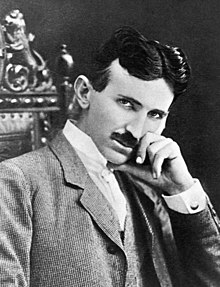Nikola Tesla (1856 - 1943) was an inventor born in Croatia, and is best known for his contributions to the design of the modern alternating current (AC) electricity supply system. He was also very bright, which was a problem because he could design his machines in his head so he didn't always build the final product. And if you don't build the final product and sell it, then you will not make much money. So Tesla came up with these brilliant machines, but he still had to borrow money to survive.
Tesla has also given his name to the electric car company Tesla Motors. One of the founders of that company, JB Straubel, was a fan of Nikola Tesla (but it wasn't he who gave the company its name), and his favorite book about the man is Wizard: The Life and Times of Nikola Tesla by Marc Seifer. I finished reading that book and learned, among other things, that one of the reasons Tesla could accomplish so much was that he was ambitious. This is very similar to Albert Einstein, who could also dedicate his life to whatever he was doing.
When Tesla was a young student, his teachers were worried about him. The reason was that he had "a veritable mania for finishing whatever I began." So he couldn't simply stop himself from doing whatever he was doing. If he began reading a book he couldn't do anything else before he had finished it. So the teachers said that "the boy was at risk of injuring his health by obsessively long and intense hours of study." He could study for 20 hours a day.
Tesla would move to the US together with his ambitions. He could experiment day and night, holidays not except. He drove himself until he collapsed, working around the clock, with few breaks. He preferred working through the night, when distractions could be minimized and concentration could be intensified. He argued that "every hour, every moment, that was not spent working on inventions was time away from his purpose." Even the intervals spent eating and sleeping delayed progress, so he reduced his sleeping to a minimum and his eating to the bare necessities. He argued he could sleep 2 hours per day while "dozing" from time to time to recharge his batteries. He said:
I get all the nourishment I require from my laboratory. I know I am completely worn out, and yet I cannot stop my work. These experiments of mine are so important, so beautiful, so fascinating, that I can hardly tear myself away from them to eat, and when I try to sleep I think about them constantly.
One other thing I learned from the book was that Tesla was also interested in Artificial Intelligence. The young Tesla studied the theories of René Descartes, who envisioned animals, including man, as simply "automata incapable of actions other than those characteristic of a machine." Tesla said that he wanted "to devise mechanical means for doing away with needless tasks of physical labor so that humans could spend more time in creative endeavors." When Tesla was asked to predict the future he said that robots and thinking machines will replace humans. His vision was that machines could liberate the worker and that fighting machines could replace soldiers on the field.
Tesla had come to see the human body in its essence as a machine. He said that memory "is but increased responsiveness to repeated stimuli." It's unclear if he actually tried to build a machine similar to himself, but he was thinking about it:
Long ago I conceived the idea of constructing an automaton which would mechanically represent me, and which would respond, as I do myself, but of course, in a much more primitive manner to external influences. Such an automaton evidently had to have motive power, organs for locomotion, directive organs and one or more sensitive organs so adapted as to be excited by external stimuli. Whether the automaton be of flesh and bone, or of wood or steel, it mattered little, provided it could provide all the duties required of it like an intelligent being.
But what is known is that Tesla built a remote controlled boat. To him, his boat was not simply a machine, it was "a new technological creation endowed with the ability to think." It was also, to him, the first non-biological life-form on the planet, arguing that life-forms need not be made out of flesh and blood. He said:
Even matter called inorganic, believed to be dead, responds to irritants and gives unmistakable evidence of a living principle within.

Slight correction. Tesla was born in Smiljan village in Croatia.
ReplyDeleteSee link:
https://en.wikipedia.org/wiki/Smiljan